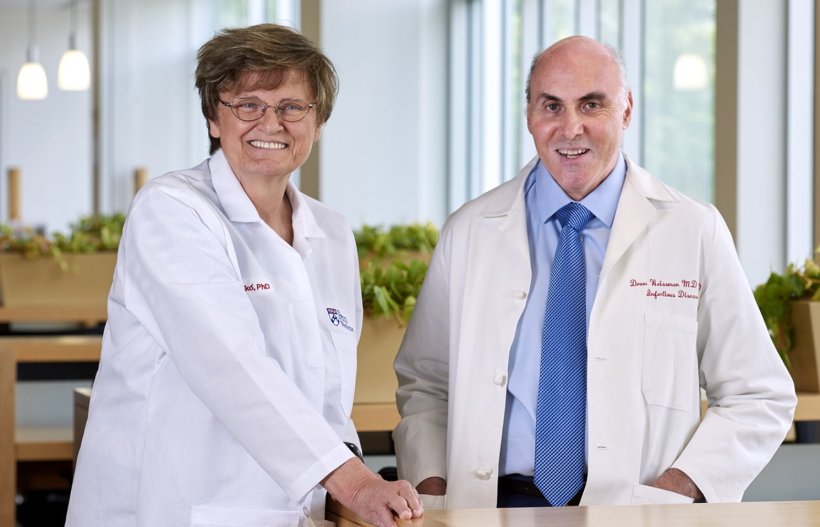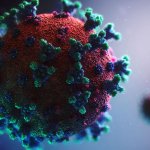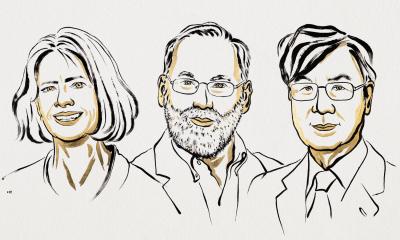
Image credit: Peggy Peterson Photography for Penn Medicine
News • For discoveries leading to mRNA vaccines against Covid-19
Nobel Prize in Medicine goes to Katalin Karikó and Drew Weissman
The Nobel Assembly at the Karolinska Institutet has today announced their decision to award the 2023 Nobel Prize in Physiology or Medicine jointly to Katalin Karikó and Drew Weissman for their discoveries concerning nucleoside base modifications that enabled the development of effective mRNA vaccines against Covid-19.
"The discoveries by the two Nobel Laureates were critical for developing effective mRNA vaccines against Covid-19 during the pandemic that began in early 2020," the prize committee reports. "Through their groundbreaking findings, which have fundamentally changed our understanding of how mRNA interacts with our immune system, the laureates contributed to the unprecedented rate of vaccine development during one of the greatest threats to human health in modern times."
Recommended article

Article • Covid-19
Coronavirus update
Years after the first outbreak and spread of coronavirus Sars-CoV-2, its impact can still be felt in everyday life. Keep up-to-date with the latest research news, political developments, and background information on Covid-19.
The two laureates are pioneers of messenger RNA research from the University of Pennsylvania, whose years of scientific partnership unlocked understanding of how to modify mRNA to make it an effective therapeutic—enabling a platform used to rapidly develop lifesaving vaccines amid the global Covid-19 pandemic. Nearly three years after the rollout of mRNA vaccines across the world, Katalin Karikó, PhD, an adjunct professor of Neurosurgery in Penn’s Perelman School of Medicine, and Drew Weissman, MD, PhD, the Roberts Family Professor of Vaccine Research in the Perelman School of Medicine, are recipients of the prize announced today by the Nobel Assembly in Solna, Sweden.
During the biggest public health crisis of our lifetimes, vaccine developers relied upon the discoveries by Dr. Weissman and Dr. Karikó, which saved innumerable lives and paved a path out of the pandemic
J. Larry Jameson
After a chance meeting in the late 1990s while photocopying research papers, Karikó and Weissman began investigating mRNA as a potential therapeutic. In 2005, they published a key discovery: mRNA could be altered and delivered effectively into the body to activate the body’s protective immune system. The mRNA-based vaccines elicited a robust immune response, including high levels of antibodies that attack a specific infectious disease that has not previously been encountered. Unlike other vaccines, a live or attenuated virus is not injected or required at any point.
When the Covid-19 pandemic struck, the true value of the pair’s lab work was revealed in the most timely of ways, as companies worked to quickly develop and deploy vaccines to protect people from the virus. Both Pfizer/BioNTech and Moderna utilized Karikó and Weissman’s technology to build their highly effective vaccines to protect against severe illness and death from the virus. In the United States alone, mRNA vaccines make up more than 655 million total doses of Sars-CoV-2 vaccines that have been administered since they became available in December 2020.
“Katalin Karikó and Drew Weissman are brilliant researchers who represent the epitome of scientific inspiration and determination. Day after day, Dr. Weissman, Dr. Karikó and their teams worked tirelessly to unlock the power of mRNA as a therapeutic platform, not knowing the way in which their work could serve to meet a big challenge the world would one day face,” said Penn President Liz Magill. “With the truest devotion to their field, they’ve already promised they will not stop here, and that is the greatest inspiration of all. Our Penn community is enormously proud of their groundbreaking achievements and this well-deserved recognition.”
“The phrase Nobel Prize elicits images of individuals whose work has, without exaggeration, changed the world,” said J. Larry Jameson, MD, PhD, executive vice president of the University of Pennsylvania for the Health System and Dean of the Perelman School of Medicine. “During the biggest public health crisis of our lifetimes, vaccine developers relied upon the discoveries by Dr. Weissman and Dr. Karikó, which saved innumerable lives and paved a path out of the pandemic. Now, the same approach is being tested for other diseases and conditions. More than 15 years after their visionary laboratory partnership, Kati and Drew have made an everlasting imprint on medicine.”
Recommended article

News • Heart failure and organ fibrosis
RNA therapeutics: potential far beyond Covid-19
RNA has already been making an impact in the context of the vaccine program, but the potential of RNA-based compounds is far from being fully tapped, as RNA allows for entirely new therapeutic approaches.
Since 1901, the Nobel Foundation has awarded prizes to those whose breakthroughs “have conferred the greatest benefit to humankind.” Prizes are bestowed to laureates whose work relates to the areas of physics, chemistry, physiology or medicine, literature, peace, and economics. Fewer than 1,000 people have received a Nobel Prize, and only 225 people have previously been awarded one in Physiology or Medicine. Karikó, who is also a professor at the University of Szeged in Hungary, is only the 61st woman to ever be named a Nobel Laureate.
Together, Karikó and Weissman have been recognized with multiple national and international commendations, including the Lasker-DeBakey Clinical Medical Research Award, the Breakthrough Prize, the Princess of Asturias Award, the Albany Medical Center Prize in Medicine and Biomedical Research, the VinFuture Grand Prize, and the Tang Prize in Biopharmaceutical Science. Their lifesaving research has been featured in hundreds of news outlets across the globe, and they were named among TIME magazine’s “Heroes of the Year” in 2021.
Source: Penn Medicine/The Nobel Assembly at Karolinska Institutet
02.10.2023











